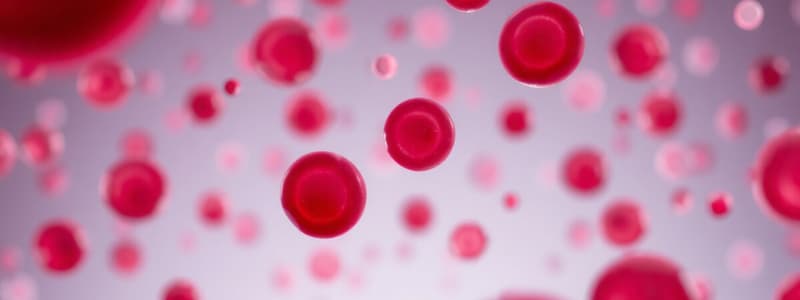Podcast
Questions and Answers
What is the effect of incompatible blood types during a transfusion?
What is the effect of incompatible blood types during a transfusion?
- They can cause red blood cell agglutination. (correct)
- They have no effect on transfusion success.
- They only affect Rh factor compatibility.
- They enhance the immune response.
All individuals with type O blood have antibodies against A antigen only.
All individuals with type O blood have antibodies against A antigen only.
False (B)
What is the primary role of blood type antigens in the immune system?
What is the primary role of blood type antigens in the immune system?
To trigger immune responses against foreign substances.
Rh incompatibility during pregnancy can lead to __________ disease of the newborn.
Rh incompatibility during pregnancy can lead to __________ disease of the newborn.
Match the following blood types with their corresponding antibodies:
Match the following blood types with their corresponding antibodies:
What percentage of whole blood does plasma comprise?
What percentage of whole blood does plasma comprise?
Red blood cells contain a nucleus and other organelles.
Red blood cells contain a nucleus and other organelles.
What is the primary function of platelets in blood?
What is the primary function of platelets in blood?
The _____ circulatory system includes the heart, arteries, capillaries, and veins.
The _____ circulatory system includes the heart, arteries, capillaries, and veins.
Match the blood components with their primary functions:
Match the blood components with their primary functions:
Which blood typing system is based on the presence of A, B, AB, or O antigens?
Which blood typing system is based on the presence of A, B, AB, or O antigens?
Capillaries are responsible for transporting deoxygenated blood back to the heart.
Capillaries are responsible for transporting deoxygenated blood back to the heart.
What is the lifespan of mature red blood cells?
What is the lifespan of mature red blood cells?
Flashcards
Blood Components
Blood Components
Blood is composed of plasma (liquid) and formed elements (cells).
Plasma
Plasma
The liquid part of blood, about 55% of whole blood.
Formed Elements
Formed Elements
The cells in blood, about 45% of whole blood.
Red Blood Cells (RBCs)
Red Blood Cells (RBCs)
Signup and view all the flashcards
Hemoglobin
Hemoglobin
Signup and view all the flashcards
White Blood Cells (WBCs)
White Blood Cells (WBCs)
Signup and view all the flashcards
Platelets
Platelets
Signup and view all the flashcards
Blood Circulation
Blood Circulation
Signup and view all the flashcards
Arteries
Arteries
Signup and view all the flashcards
Capillaries
Capillaries
Signup and view all the flashcards
Veins
Veins
Signup and view all the flashcards
Blood Typing
Blood Typing
Signup and view all the flashcards
Agglutination
Agglutination
Signup and view all the flashcards
Blood type antigens
Blood type antigens
Signup and view all the flashcards
Antibodies
Antibodies
Signup and view all the flashcards
Transfusion reaction
Transfusion reaction
Signup and view all the flashcards
Rh factor
Rh factor
Signup and view all the flashcards
Hemolytic disease of the newborn
Hemolytic disease of the newborn
Signup and view all the flashcards
Blood Type O
Blood Type O
Signup and view all the flashcards
Blood Type A
Blood Type A
Signup and view all the flashcards
Study Notes
Blood Components
- Blood is a complex tissue composed of various cellular components suspended in a liquid matrix called plasma.
- Plasma, the liquid portion, comprises approximately 55% of whole blood. It's primarily water but also contains dissolved proteins (albumin, globulins, fibrinogen), electrolytes, nutrients, hormones, and waste products.
- Formed elements, the cellular components, make up about 45% of whole blood and include red blood cells (erythrocytes), white blood cells (leukocytes), and platelets (thrombocytes).
Red Blood Cells (Erythrocytes)
- Primarily responsible for oxygen transport.
- Contain hemoglobin, a protein that binds oxygen.
- Biconcave shape maximizes surface area for gas exchange.
- Mature red blood cells lack a nucleus and other organelles, making space for hemoglobin.
- Lifespan is about 120 days.
White Blood Cells (Leukocytes)
- Crucial part of the immune system.
- Several types with different functions in immune responses.
- Granulocytes (neutrophils, eosinophils, basophils) and agranulocytes (lymphocytes, monocytes) are the two main categories.
- They defend the body against pathogens and foreign substances.
Platelets (Thrombocytes)
- Essential for blood clotting.
- Fragments of megakaryocytes, bone marrow cells.
- Initiate the clotting cascade to stop bleeding.
Blood Circulation Mechanics
- Blood circulates throughout the body via a closed circulatory system.
- Consists of a network of arteries, capillaries, and veins.
- The heart acts as a pump, propelling blood through this system.
- Arteries carry oxygenated blood away from the heart.
- Capillaries facilitate exchange of oxygen, nutrients, and waste products between blood and tissues.
- Veins carry deoxygenated blood back to the heart.
- Pulmonary circulation involves blood flow between the heart and the lungs for gas exchange. Systemic circulation involves blood flow throughout the rest of the body.
- Blood pressure is the force exerted by blood against the walls of blood vessels.
Blood Typing Methods
- Blood typing classifies blood based on the presence or absence of specific antigens (proteins) on the surface of red blood cells.
- The most common blood typing system is the ABO system, based on the presence of A, B, AB, or O antigens.
- The Rh factor is another important blood group system, categorized as Rh+ or Rh-.
- Blood typing is crucial for blood transfusions to avoid potentially fatal reactions. Incompatible blood types can lead to agglutination (clumping) of red blood cells.
- Blood tests can accurately determine a person's blood type.
Immune Response and Blood Types
- Immune responses are triggered by antigens, foreign substances that induce an immune response.
- Blood type antigens play a role in immune reactions.
- Individuals can have antibodies against blood type antigens they do not possess. For example, a person with type O blood has antibodies against both A and B antigens; a person with type A blood has antibodies against B antigen.
- Transfusion reactions occur when incompatible blood types are mixed.
- The immune response to donor blood cells can lead to serious complications from transfusion.
- The Rh factor is significant in pregnancies, where Rh incompatibility between mother and fetus can lead to hemolytic disease of the newborn.
Studying That Suits You
Use AI to generate personalized quizzes and flashcards to suit your learning preferences.




